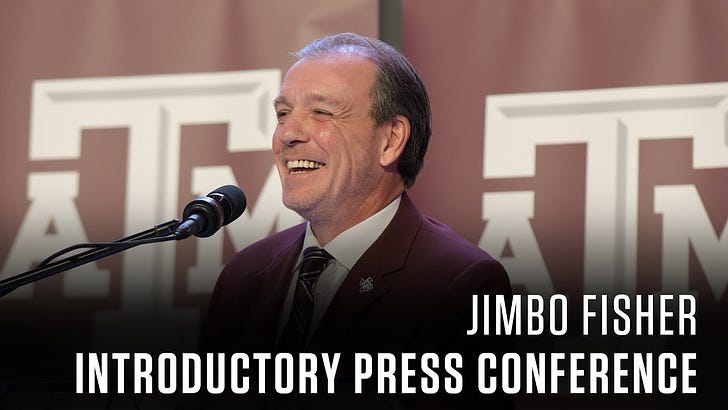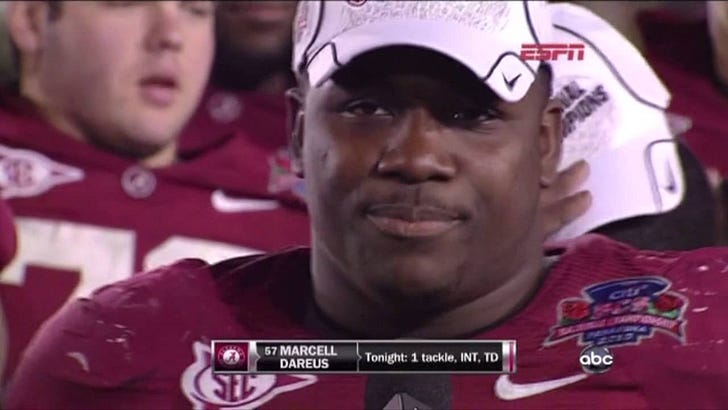I labored for a bit on what exactly to write about Nick Saban’s unexpected retirement. What could be said that wouldn’t be lost in the din?
After all, no shortage of content has flooded the ether since the coach announced the move on Jan. 10. From homages to his unparalleled greatness in an era when sports pursued parity, to speculation about his motivations seeking deeper significance in the 72-year-old calling quits, to the downright silly that invoked his abbreviated tenure with the NFL’s Miami Dolphins to try downplaying Saban’s significance1, seemingly every base is covered.
Oh, and rumor-mongering about the resulting haed-coaching vacancy at Alabama. So much rumor-mongering.
Jimbo Fisher, Jedd Fisch and Why It's Best to Admit You Don't Know the Future
Every November signals the unofficial beginning of the college football coaching carousel season, and the first high-profile seat on the ride opened Sunday morning with Texas A&M’s dismissal of Jimbo Fisher. As the attraction starts to twirl, the accompanying carnival tune comes from the chorus of pundits offering up lists of potential yet mostly unrealistic candidates, declaring the attractiveness of open positions and grading the quality of hires before any of them coach a game.
Perhaps there’s nothing I can offer about Nick Saban that’s completely unique, but I had to offer something. And being so compelled is the story of Nick Saban in itself.
The coach’s impact on the sport is impossible to ignore for myriad reasons that transcend the seven national championships we won at LSU and Alabama. Saban became the Dean of College Football during his time in Tuscaloosa, and did so without ever demanding that mantle.
He deviates from Mike Krzyzewski in that regard, a basketball contemporary to whom one could draw fair parallels. Coach K was the Dean of College Basketball after THE Dean — one-time rival Dean Smith — retired in 1997.
But Coach K seemed to revel in filling that role. The more I learned about Saban, the more he seemed like someone who just wanted to coach winning football.
At the same time, I don’t know that he was win at all costs. I preface this sentiment noting that we in the sports commentary community tend to lionize coaches and athletes to a degree that’s impossible to meet.
They may be excellent at what they do, but they’re still human. They have flaws. I certainly don’t know Nick Saban. I do appreciate, however, that in more than 15 years coaching Alabama, I never hear of or read former players criticizing their time in the program.
In that same vein, working on a feature for Athlon Sports ahead of Championship Week 2019 — when former Saban assistants were head coaches in five FBS conference title games and another in the FCS Playoffs — I was impressed with how glowingly all spoke of the coach.
It should go without saying that I have a ton of respect for Saban. For at least the first half of his tenure at Alabama, I couldn’t say I liked him.
His campaign against hurry-up offenses in the early 2010s annoyed me as someone in the Pac-12 footprint. Once Saban embraced no-huddle offense with spread schemes, however, Alabama ushered in a new brand of football that blended the physicality up front and power run game with potent passing.
It’s no coincidence the only Heisman Trophy winners in the last 13 years who played a position other than quarterback came out of Alabama. Each did so with much different games: running back Derrick Henry with his hard-changing rushing style and wide receiver DeVonta Smith making ridiculous catches in a wide-open aerial attack.
Oh, yeah: Alabama also had a quarterback Heisman winner emerge from Saban’s philosophical reversal with Bryce Young.
Now, Saban wasn’t running the offenses that fostered the individual successes of Henry, Smith nor Young — just as he wasn’t when Mark Ingram became the Crimson Tide’s first-ever Heisman winner in 2009.
That was a time in which social-media users who used jpgs of Saban as their profile avatars insisted an offense consisting of a fullback, tight end and quarterback under-center passing a maximum of 20 times was real football. And, it was a style of offense that complemented the hard-nosed defensive approach on which Saban’s teams thrived.
But when teams coached by Kevin Sumlin, Gus Malzahn and Hugh Freeze beat Alabama in consecutive seasons, Saban understood the need to defy convention. He didn’t call the Crimson Tide’s offenses, but he also recognized the offense needed to evolve — and that it could without compromising the program’s overall emphasis on physicality and defense.
Perhaps ironically, I view an Alabama team that didn’t win the national championship as the most transformative for the sport as a whole: 2016.
A defense with Reuben Foster, Ryan Anderson and Jonathan Allen wreaking havoc was arguably as good as the vaunted 2011 Crimson Tide. At the same time, the offense played at a brisk pace with 1,056 plays — 154 more in just two games more than the 2020 Tide.
The healthy mix of multifaceted run and pass showcased Lane Kiffin at his best as an offensive coordinator. It’s not much of a limb to go on suggesting that Kiffin wouldn’t be at Ole Miss today — and certainly not considered a candidate to head up Alabama — without his time on Saban’s staff.
That Alabama team more than any squad before it proved physicality and finesse can blend, and blend well. Plenty of the best programs around the nation operate in such a manner today, and it’s a boon to the game.
Saban’s ability and willingness to adapt in such a manner signals that molding philosophies around players, not forcing players into a philosophy, is a winning strategy.
***
With the coach on his way out, I’ll sign off with an unrelated anecdote but my personal favorite about Nick Saban, which predates his coaching days.
As a starting defensive back at Kent State, Saban played for legendary head coach Don James. James guided the Golden Flashes to the 1972 Tangerine Bowl, which until 2012, was Kent State’s last bowl-game appearance.
Now-defunct University of Tampa faced Kent State. The Spartans roster included Paul Orndorff, who rushed for four touchdowns in 1972. Orndorff went on to stardom in professional wrestling as “Mr. Wonderful,” and on a segment during a 1982 Georgia Championship Wrestling broadcast, watched clips of his gridiron glory.
Tampa’s roster also featured the No. 1 pick in the following spring’s NFL draft, John Matuszak.
Matuszak, an All-American in 1972, was a remember of two Super Bowl-winning teams with the Oakland Raiders. However, he’s best known for playing Sloth in The Goonies.
I don’t know if Nick Saban has ever seen The Goonies, but I have to assume he’d appreciate Sloth’s love to Baby Ruth bars given the coach’s own affinity for Little Debbie oatmeal cream pies.
I saw USA Today’s headline on Nick Saban’s Dolphins stint and rolled my eyes. Aside from the kudos Bill Belichick long gave Saban for the Alabama coach’s efforts on the Cleveland Browns’ staff, no evaluation of Saban in Miami is complete without dissecting the failed off-season pursuit of Drew Brees in 2006.
Fortunately, The Press Break dove deep into it.
What-If Wednesday: Drew Brees Joins the Miami Dolphins
January 2010 Confetti falls to the turf as a new champion out of the Southeast is crowned football’s champion. Nick Saban hoists the hardware in a moment emblematic of the first major step toward solidifying perhaps the greatest legacy in the game’s history.





